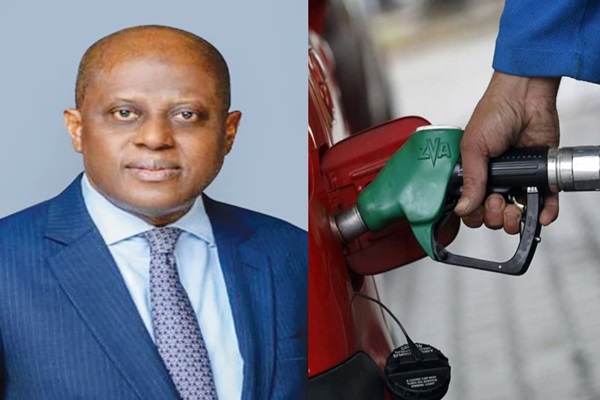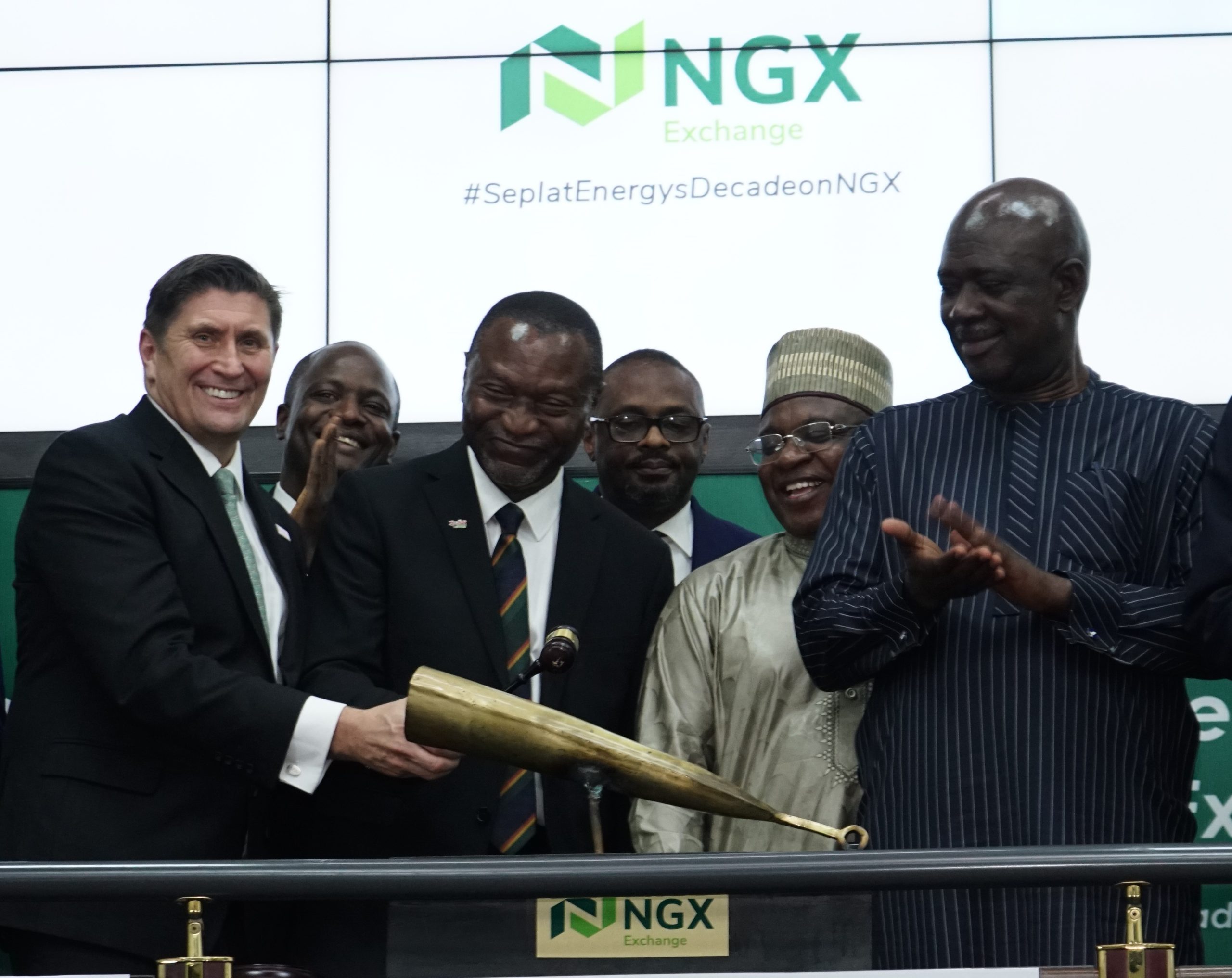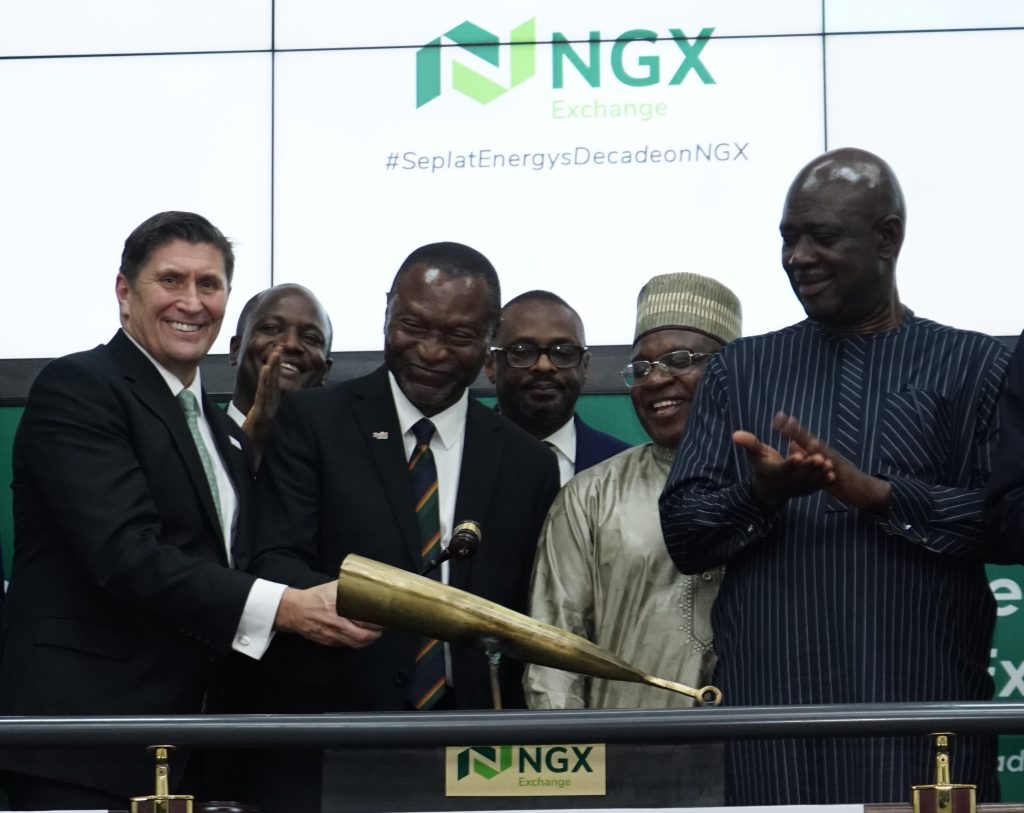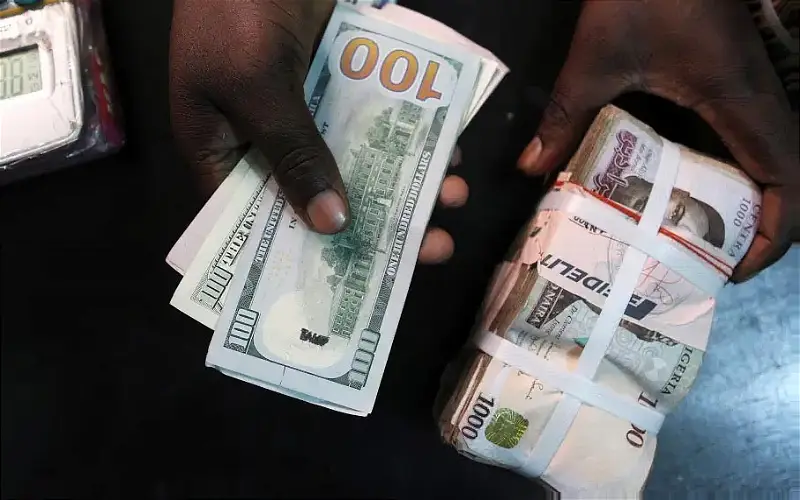Business
Petrol Prices To Fall Over Refineries’ Take Off, Says Cardoso

The pump prices of Premium Motor Spirit (PMS) petrol will moderate this year as government and private-owned refineries begin operation, Central Bank of Nigeria (CBN) Governor, Olayemi Cardoso has said.
He spoke on Wednesday, January 24, at the launch of the Nigerian Economic Summit Group (NESG) 2024 Macroeconomic Outlook Report in Lagos.
Cardoso said the expected stabilisation or reduction in fuel costs is poised to have far-reaching implications across various sectors, contributing significantly to overall economic efficiency and resilience.
While Dangote Refinery has already commenced production, the Port Harcourt Refinery is expected to begin production anytime from now.
Cardoso said the apex bank, the Ministry of Finance and the NNPCL have collaborated to ensure that all FX inflows are returned to the Central Bank to boost reserves accretion.
He described the naira, which exchanges around N1,370 to the dollar at the parallel market as undervalued.
“We believe that the naira is currently undervalued and, coupled with coordinated measures on the fiscal side, we will expedite genuine price discovery in the near term,” he said.
In summary of the NESG 2024 Macroeconomic Outlook Report in Lagos, the Chief Economist at NESG, Dr. Olusegun Omisakin, listed some economic outcomes of achieving a stable and appropriate pricing of the exchange rate in Nigeria.
The NESG report advised that stabilising the exchange rate through a functional and transparent foreign exchange market entails enhancing market liquidity through regular auctions, reducing administrative restrictions, and ensuring efficient allocation of FX reserves.
“Adopting a managed float system, regulating speculative activities, and encouraging foreign investments would bolster market confidence. Besides, access to FX needs to be realigned to facilitate international trade and transactions – as such, local access needs to be to the limit of the Naira equivalent. Reinforcing monetary policies for inflation control and export diversification would promote currency stability,” the report advised.
Cardoso acknowledged the challenges facing the economy and the resistance to proposed solutions by various stakeholders, assuring that the economy is now at a turning point, and the bold reforms being undertaken across different segments of the economy, while initially challenging, are ultimately directed towards addressing these challenges in a sustainable manner.
“I am confident that we are already witnessing positive outcomes, and these will undoubtedly become more apparent in the near future. The dedicated and relentless efforts being made are certain to bring about significant and positive changes for our economy.”
“Indeed, recent reports from international rating agencies such as Fitch, Moody’s, and commendations from multilateral banks like 3 Classified as Confidential the World Bank reflect this, with upgrades to Nigeria’s ratings from stable to positive. These reports acknowledge the possible reversal of the deterioration in the country’s fiscal and external position due to the authorities’ reform efforts,” Cardoso said.
“While noting the painful adjustments, they all identify a direction of travel that will unlock the much needed growth and development for our economy in the medium to long term.”
He said the rising costs of food prices and volatility in the forex market will soon be addressed.
On economic growth, he said the global economy is currently grappling with persistent challenges, including inflation and subdued growth prospects.
Despite Gross Domestic Product (GDP) growth outperforming expectations in 2023, it is projected to further moderate in 2024 due to tightened financial conditions, sluggish trade expansion, and reduced business and consumer confidence. The International Monetary Fund (IMF) anticipates a mild slowdown in global economic growth to 2.9 percent in 2024, down from the 3.0 percent growth observed in 2023, with Asia driving the majority of the projected global growth in 2024, similar to the previous year.
He said the projections for the nation’s economy paint an optimistic trajectory as the Federal Government of Nigeria anticipates real GDP growth of 3.76 percent in 2024, slightly surpassing the estimated 3.75 percent for 2023.
The optimism, he said, was underpinned by the implementation of key government reforms set to shape the economic landscape. Foremost among the factors contributing to this positive outlook is the expectation of improved crude oil prices and production, highlighting the crucial role the oil industry is expected to play in driving economic growth.
Cardoso said the positive outlook for Industry, Services, Agriculture, and Mining, Electricity, Gas & Water Supply sub-sectors reflects the potential effect of market-based reforms through private investment and SMEs-led growth that would contribute to business improvement and confidence.
“Government reforms in the mining and energy sub-sectors are expected to serve as a catalyst for growth and development. 3. While the potential for growth exists in 2024, each sector may encounter unique challenges and opportunities,” he said.
He said that inflationary pressures are expected to decline in 2024 due to the CBN’s inflation-targeting policy, which aims to rein in inflation to 21.4 percent.
This will be aided by improved agricultural productivity and the easing of global supply chain pressures, benefiting businesses by boosting consumer confidence and purchasing power.
He explained that the CBN’s adoption of the inflation-targeting framework involves clear communication, use of monetary policy instruments, and collaboration with fiscal authorities to achieve price stability, fostering market confidence and positively influencing consumer behaviour.
“The outlook for decreasing inflation in 2024 will have a profound impact on businesses, providing a more predictable cost environment and potentially leading to lowered policy rates, stimulating investment, fueling growth, and creating job opportunities,” he said.
Cardoso said the expected stability in the foreign exchange market for 2024 can be attributed to the reduction in petroleum product imports and the recent implementation of a market-determined exchange rate policy by the CBN.
“This reform is designed to streamline and unify multiple exchange rates, fostering transparency and reducing opportunities for arbitrage. The resulting consistent and stable exchange rate will not only boost investor confidence but also attract foreign investment, elevating Nigeria’s appeal to global investors,” he said.
Cardoso said the NESG’s Macroeconomic Outlook Report for 2024 emphasises the necessity of economic transformation under the central theme, “Economic Transformation Roadmap: Medium-Term Policy Priorities.”
“This theme underscores the requirement for a clearly outlined roadmap comprising distinct yet interconnected phases and essential policy recommendations. This resonates with me as we have just last week, launched a new 5-year Strategy for the Central Bank of Nigeria for the period 2024-2028 that provides a clear roadmap for achieving our mandates,” he said.
The NESG report explained that when exchange rates are stable, everyone is better off. Price stability supports economic growth and employment. It allows people to make more reliable plans for borrowing, saving, and expanding businesses.
“Decreased volatility of the exchange rate helps to support stability in inflation, which mainly affects low-income households because they have fewer resources to protect themselves. In the situation of price stability, it helps to maintain social cohesion and stability. History has shown that episodes of high inflation tend to be associated with social unrest,” the report.
According to the report, increased capital inflows will fortify the nation’s external reserves, establishing a robust defence against external shocks.
“This can only happen with the stability of the exchange rate. Capital inflows, comprising foreign investment, loans and remittances, elevate the reserve levels, bolstering Nigeria’s financial stability and economic resilience,” it said.
The NESG report advised that in addition to nominal enhancements in revenue, the country’s revenue-to-GDP ratio must reach a minimum threshold of 15 percent to substantiate the processes of economic growth and stabilisation.
“The country must significantly decrease its current public debt service-to revenue ratio, aiming for a reduction to less than 22 percent from the current high of 80.2 percent as of 2022. This reduction is crucial to create fiscal space, enabling the government to reallocate funds toward economic development and stability initiatives.
“A moderate fiscal deficit can be a useful tool for financing essential investments and stimulating economic activity. Hence, the optimal level of fiscal deficit that supports economic growth and stability in Nigeria requires a careful balance. A fiscal deficit of less than three per cent as stipulated in the FRA 2007 is considered appropriate for the economy,” it said.
Business
Seplat Energy celebrates a decade of Dual Listing with Bell Ringing Ceremony at Nigerian Stock Exchange

[L-R: Mr. Roger Brown, CEO Seplat Energy Plc; Mr. Temi Popoola, Group CEO, Nigerian Exchange (NGX) Group; Mr. Udoma Udo Udoma, Board Chairman, Seplat Energy Plc; Mr. Jude Chiemeka, Ag. CEO, NGX; Alhaji (Dr.) Umaru Kwairanga, Group Chairman, NGX Group; Sen. Heineken Lokpobiri, Hon. Minister of State for Petroleum Resources (Oil), at the NGX Closing Gong Ceremony to mark a Decade of Listing of Seplat Energy on the NGX and the London Stock Exchange … on Tuesday]
The Nigerian Exchange (NGX) reverberated with the jubilant sound of the bell as Seplat Energy PLC, a leading independent indigenous energy company, celebrates a significant milestone – a decade of its dual listing on both the Premium Board of the Nigerian Exchange (NGX) and the Main Market of the London Stock Exchange (LSE). This commemorative event, attended by esteemed representatives from Seplat Energy, the NGX, the Nigeria government, and other institutional partners, marks a decade of strategic partnership and commitment to excellence in the energy sector.
During his speech at the anniversary, Mr. Roger Brown, CEO, Seplat Energy, expressed delight over the feat, reiterating Seplat Energy’s commitment to leading Nigeria’s energy transition, adding that the power of indigenous companies is to bring growth and prosperity to their home countries and the people. “One example of how Seplat Energy is making an enduring difference to Nigeria and host communities where we operate is that nearly $50m had been invested by our Joint Venture partnerships in communities since our inception to date,” Brown said.
“Truly, Seplat Energy has delivered significant value by enhancing strategic, operational and financial achievements in 10 years as a listed company,” he added.

Sen. Heineken Lokpobiri, Hon. Minister of State for Petroleum Resources (Oil); Alhaji (Dr.) Umaru Kwairanga, Group Chairman, NGX Group; ; Mr. Udoma Udo Udoma, Board Chairman, Seplat Energy Plc; Mr. Roger Brown, CEO Seplat Energy; and Mr. Bello Rabiu, Senior Independent Non-Executive Director, Seplat Energy, lead other Directors and Management of Seplat Energy, at the NGX Closing Gong Ceremony to mark a Decade of Listing of Seplat Energy on the NGX and the London Stock Exchange … on Tuesday
In his comments, Mr. Temi Popoola, CEO, NGX Group, emphasized the significance of Seplat Energy’s decade of dual listing stating, “If we were to look back to our market and tried to find landmarks, the last major landmark you will find in the last ten years is this transaction that we are celebrating today, and the market is very grateful for that”.
Congratulating Seplat Energy on this milestone, in his welcoming remarks, Alhaji (Dr.) Umaru Kwairanga, NGX Group Chairman, highlighted the importance of partnerships between the NGX and companies like Seplat Energy in driving economic growth and development stating that “Seplat’s journey symbolises resilience, innovation, and a commitment to excellence, making them a beacon of corporate governance and operational expertise. Seplat Energy has emerged as a leading indigenous energy company, deeply integrated into Nigeria’s economic landscape and the NGX Group remains committed to supporting companies like Seplat Energy as they drive economic growth and contribute to our nation’s prosperity”.
Reflecting on the significance of the decade of dual listing, Mr. Udoma Udo Udoma, Board Chairman, Seplat Energy remarked, “Seplat Energy is committed to driving Nigeria’s transition to sustainable and affordable energy, harnessing its power to improve lives by transforming the economy. We have ambitious goals. We are investing in Nigeria. We will support the federal government’s energy transition policy, and we will partner with FG in whatever area they want us to do so. That is our commitment. We will grow Seplat while also maintaining the highest standard of corporate governance”.
Also commending Seplat Energy on the decade of listing, Jude Chiemeka, Acting CEO, NGX stressed the importance of the capital market in helping companies raise funds and creating wealth for all, stating that “Seplat Energy was listed at 576 Naira at listing and yesterday it closed at 3,370 which is an increase of over 484%. The figures show that in the last 10 years, the company has paid out $575m in dividend payments to shareholders in Nigeria and London where they are also listed, so this company has given investors a huge opportunity to really participate in wealth creation. Reports show that Nigeria would be among the top 20 countries in the next 25 years, and I think Seplat is poised to be one of the institutions driving growth, prosperity, and inclusion in our nation”.
Also gracing the closing gong ceremony was Sen. Heineken Lokpobiri, Minister of State, Petroleum Resources (Oil), who gave kudos to Seplat Energy on their laudable achievements while also assuring of the Federal Government’s commitment to providing support to the company. “I am happy to be part of today’s celebration and Seplat’s exceptional performance in the last ten years and as Minister of State, Petroleum Resources, I assure that we will partner with Seplat to expand their investments, not only for the benefit of its shareholders, but also for Nigeria. The least the government can do anywhere in the world is to create an environment where companies like Seplat continue to thrive”.
Seplat Energy remains focused on driving value for its shareholders, pursuing strategic acquisitions, and championing sustainable practices in the energy sector, with ongoing projects such as the acquisition of Mobil Producing Nigeria Unlimited and the development of the ANOH Gas processing plant. The company’s diversified portfolio, including eight onshore and shallow water assets strategically located in the Niger Delta region, has enabled it to maximize hydrocarbon production while actively contributing to Nigeria’s energy security and economic development.
Seplat Energy’s robust gas portfolio, highlighted by the ANOH Gas processing plant project, underscores its pivotal role in Nigeria’s transition to gas. This aligns with Nigeria’s broader energy goals, promoting cleaner energy sources, reducing reliance on traditional fossil fuels and driving a greener and more sustainable energy landscape in Nigeria.
With commitment to corporate governance, corporate citizenship, and making significant corporate social investments, as reflected in its rigorous approach to performance assessment and its investment in community development initiatives, Seplat Energy is poised for continued success in the years to come.
Business
Naira Appreciates To ₦1,280/$ At Parallel Market

The naira, on Friday, appreciated to N1,280 per dollar at the parallel section of the foreign exchange (FX) market.
The current FX rate signifies a 5.19 percent appreciation from the N1,350/$ reported on March 27.
Currency traders in Lagos, also known as bureau de change (BDCs) operators, quoted the buying rate of the greenback at N1,260 and the selling price at N1,280 — leaving a profit margin of N20.
“The price of the dollar as well as other major currencies have been falling. It is affecting our business as some customers prefer to keep their currencies than change it with us,” a currency trader identified as Aliyu told TheCable.
At the official section of the FX market, the local currency depreciated by 0.69 percent to N1,309.39/$ on March 28 — from N1,300.43/$ on March 27.
Meanwhile, the Central Bank of Nigeria (CBN), on March 29, said the economy recorded over $1.5 billion in foreign exchange (FX) inflow this month, indicating its monetary policy initiatives are effective.
The apex bank said the naira is headed in the right direction, and the administration of Yemi Cardoso, CBN governor, remains committed to ensuring the stability of the market and the appropriate pricing of the naira against other major currencies worldwide.














